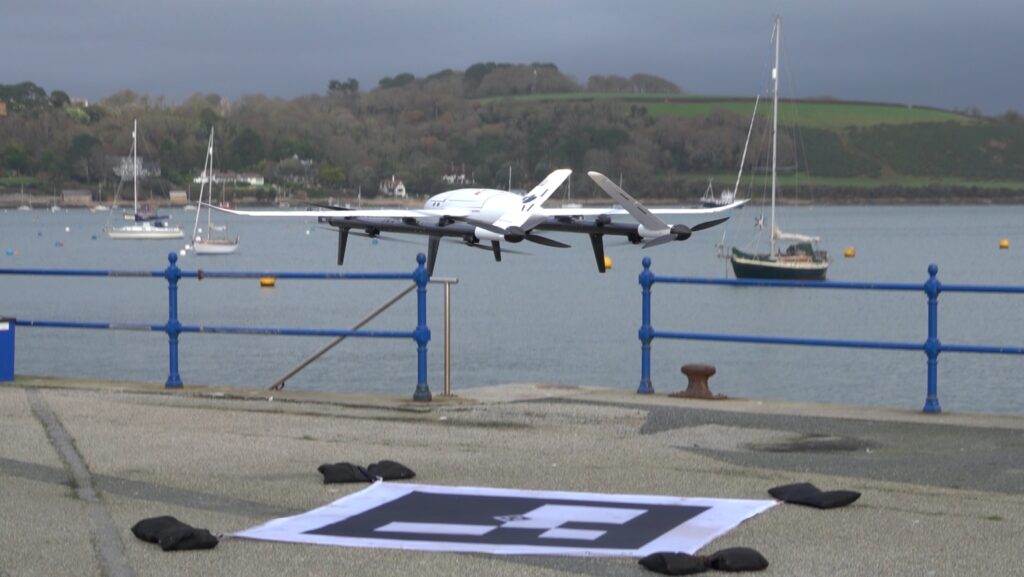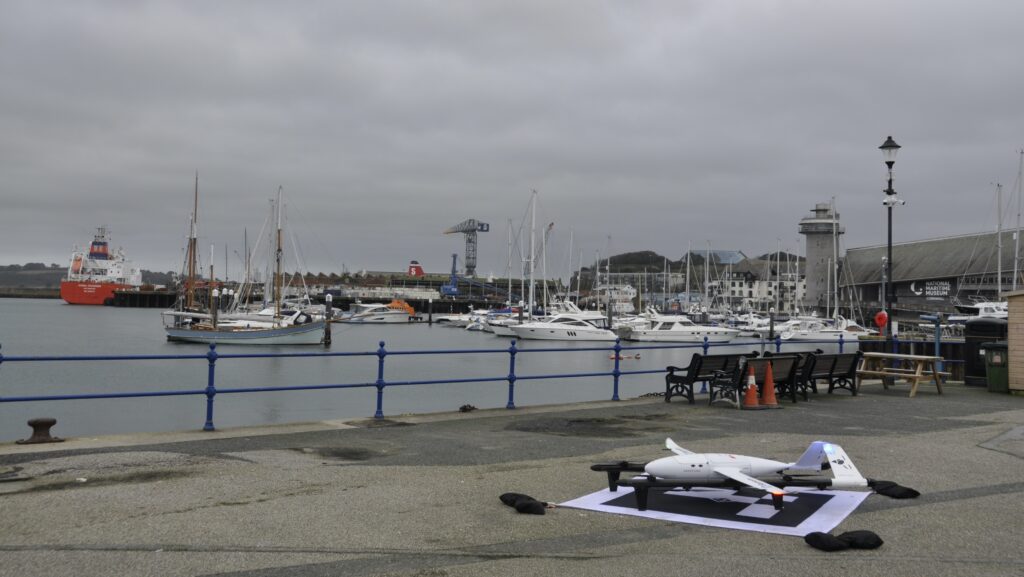Open Skies Cornwall test drones over Falmouth Harbour

Drones have been flying over the UK’s first ‘drone-friendly’ harbour in Falmouth as part of ship-to-shore flight trials carried out by Open Skies Cornwall. That’s a UK Research and Innovation-Future Flight Challenge programme, delivered by Innovate UK.
The flights are testing Falmouth Harbour’s ground infrastructure, flying capabilities and airspace for future maritime-focused drone activities, such as the delivery of emergency medical, food bunkering or maintenance supplies.
“DronePrep has prioritised healthcare and resilience use cases in the region since 2020, including during the Covid-19 lockdown, so the local community is trusting of our work and that the visible use of drones is there to serve the local community,” says Gareth Whatmore, CEO of DronePrep and project lead for Open Skies Cornwall. “Our work to explore how we may help and service maritime communities is an extension of this.”
Open Skies Cornwall’s aspirations are to fly sorties for real-world use cases to large civilian vessels at strategic moorings in the harbour. It also aims to intercept vessels up to 50 miles offshore in the Atlantic Ocean/Celtic Sea, providing additional connectivity for maritime workforces at sea.
“We’ve been operating commercial ship-to-shore drone deliveries in Singapore since 2022, providing a safer, faster, more sustainable link between the shore and vessels in the port,” says Rhys Gittoes, Open Skies Cornwall project lead at Skyports Drone Services. “Our flights in Falmouth Harbour are part of our broader efforts to demonstrate, trial and test use cases for drone services across the UK.”
Gittoes, says the company is well versed in the complexities, challenges, and requirements of enabling daily electric drone deliveries.
“Each day, we deliver a range of cargo to the vessels in the Port of Singapore. This could be oil samples, cash, spare parts and tools, healthcare items, key documentation or other critical items. We even make sure to deliver treats to our customers for celebration such as Lunar New Year as a way of showing the value of the service to every individual on the ship – from the Captain to the deckhands.”
Rhys Gittoes
“For the Open Skies Cornwall project, we’ll be applying these learnings from operating commercial drone services in the world’s second busiest port Falmouth Harbour. This depth of operational and technical expertise, coupled with the local knowledge and enabling power of our consortium partners, is invaluable, and we’re sure will go a long way in facilitating the launch of a ship-to-shore service for Cornwall.”
Landing locations for marine drones identified in Falmouth Harbour
The trials identified four landing locations in Falmouth Harbour, and tested infrastructure in the harbour itself. New landing locations and flying routes along the Cornish coast towards Truro were also visited thanks to facilitation work along the upper reaches of the Fal Estuary by Port of Truro and Cornwall Council.
“Our consortia members have a wealth of experience delivering ship-to-shore drone flights around the world, but these trials are essential for designing and testing infrastructure and procedures specific to this harbour environment,” says Whatmore.
Critical factors for setting up drone service
Critical to scaling service is fostering strong links with the community. “We’ve sought to develop strong relationships with enabling authorities in Singapore, including the Civil Aviation Authority and the Maritime Port Authority,” says Gittoes. “The honest and open relationship we have, coupled with Singapore’s innovative attitude, has been critical for scaling the service. Another area we focus on is communicating the value and applicability of our drone services, so that ship captains coming into the port know they can take advantage of it.”
Gareth Whatmore, CEO of DronePrep and project lead for Open Skies Cornwall, believes that bringing local communities along with the programme is also crucial. “Over the last 12-18 months, we’ve invested a lot of time with a variety of stakeholders – from landowners, infrastructure providers and the aviation industry to the harbour itself and the local maritime community – with the goal of fully understanding the local landscape, it’s specific needs and challenges.
“For example, when identifying take off and landing areas in the harbour, we need to consider not only locations that work well for the harbour during the winter months but also those that won’t interfere with tourism during the busier summer season.”
Gareth Whatmore
“Making sure drone operations integrate as seamlessly as possible with existing activities and systems – in the harbour, its airspace and further out to sea – have also been key areas of focus.”
Whatmore continues: “We have been incredibly fortunate in Falmouth that engagement levels have been strong from the start. Findings from our initial consultation period are now shaping the trials in the harbour, and good attendance at our community event last week is a reflection of that engagement.
“We can never take that engagement for granted though. As well as testing technical capabilities, these more-recent trials shone a spotlight on the project and we remain keen to hear from any members of the local and maritime communities, such as cruise line operators, who may wish to get involved with further trials we are planning for later this year.”
Miles Carden, CEO at Falmouth Harbour, says: “The Open Skies Cornwall project was always a challenge to us as a Harbour Authority but the funding from Innovate UK is now realising some really exciting flight activity in the harbour, which we hope will lead to dedicated airspace and commercial operations in future.
“The efficiency, safety and environmental benefits of using drones for commercial maritime activity are very exciting and could potentially drive significant additional economic value to Falmouth. We hope to accelerate the planned tests and use today’s operations as a springboard for new activity right through 2024.” Falmouth Harbour recently appointed environmental scientist Natasha Collings-Costello to help shape the current strategy and future prosperity for Falmouth Harbour in Cornwall, which is known as the UK’s ‘Atlantic gateway’.

The south west appears to be a favoured drone testing ground. Last year, the Royal Life Saving Society UK started working with the RNLI to test a new Emergency Response Drone Pilot rescue service at Crantock Beach in Newquay, Cornwall. The drones are said to be capable of improving observation of people in the water, broadcasting pre-recorded and live messages via a Tannoy system, and have the potential to deploy lifesaving items, such as inflatable buoys.











